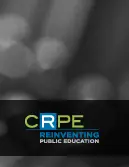In the spring of 1999, the Washington State Legislature passed ESSB5418, which created the outline of a statewide accountability system. The state’s 1993 Education Reform Act already committed the state to set standards for student learning, create a statewide exam (the WASL) to assess student progress toward these standards, and develop a system to hold schools and districts accountable for student performance. ESSB5418 offered the specific guidelines for the state’s accountability system and created the Academic Achievement and Accountability Commission (AAA Commission) to provide “oversight of the state’s educational accountability system.”
The Center on Reinventing Public Education recognized that lessons learned from other states’ experiences could be of use to Washington’s AAA Commission. In addition, other states attempting to build school accountability could also benefit from an analysis of the challenges and successes of implementing effective accountability systems.
This paper is the result of a review of efforts across the country, and specifically in five states, to introduce performance accountability into education reform strategies and serves as an extension to the Center’s 1997 publication, “Toward a K-12 Education Accountability System in Washington State,” which provided a general framework for creating a state accountability system.





